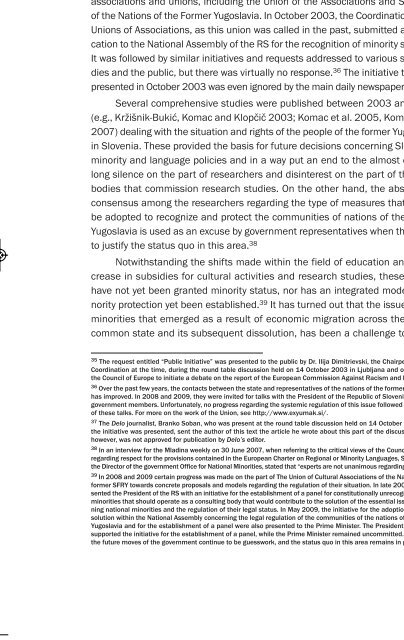The Scars of the Erasure_web
The Scars of the Erasure_web
The Scars of the Erasure_web
- No tags were found...
You also want an ePaper? Increase the reach of your titles
YUMPU automatically turns print PDFs into web optimized ePapers that Google loves.
<strong>Erasure</strong>_4a 10.1.11 20:29 Page 241THE ERASED LANGUAGE2413.4 Self-organization and efforts towards <strong>the</strong> recognition <strong>of</strong> minoritystatus<strong>The</strong> nations <strong>of</strong> <strong>the</strong> former Yugoslavia in Slovenia are organized into manyassociations and unions, including <strong>the</strong> Union <strong>of</strong> <strong>the</strong> Associations and Societies<strong>of</strong> <strong>the</strong> Nations <strong>of</strong> <strong>the</strong> Former Yugoslavia. In October 2003, <strong>the</strong> Coordination <strong>of</strong> <strong>the</strong>Unions <strong>of</strong> Associations, as this union was called in <strong>the</strong> past, submitted an applicationto <strong>the</strong> National Assembly <strong>of</strong> <strong>the</strong> RS for <strong>the</strong> recognition <strong>of</strong> minority status. 35It was followed by similar initiatives and requests addressed to various state bo -dies and <strong>the</strong> public, but <strong>the</strong>re was virtually no response. 36 <strong>The</strong> initiative that waspresented in October 2003 was even ignored by <strong>the</strong> main daily newspaper, Delo. 37Several comprehensive studies were published between 2003 and 2007(e.g., Kržišnik-Bukić, Komac and Klopčič 2003; Komac et al. 2005, Komac et al.2007) dealing with <strong>the</strong> situation and rights <strong>of</strong> <strong>the</strong> people <strong>of</strong> <strong>the</strong> former Yugoslaviain Slovenia. <strong>The</strong>se provided <strong>the</strong> basis for future decisions concerning Slovenianminority and language policies and in a way put an end to <strong>the</strong> almost decadelongsilence on <strong>the</strong> part <strong>of</strong> researchers and disinterest on <strong>the</strong> part <strong>of</strong> <strong>the</strong> statebodies that commission research studies. On <strong>the</strong> o<strong>the</strong>r hand, <strong>the</strong> absence <strong>of</strong>consensus among <strong>the</strong> researchers regarding <strong>the</strong> type <strong>of</strong> measures that shouldbe adopted to recognize and protect <strong>the</strong> communities <strong>of</strong> nations <strong>of</strong> <strong>the</strong> formerYugoslavia is used as an excuse by government representatives when <strong>the</strong>y wantto justify <strong>the</strong> status quo in this area. 38Notwithstanding <strong>the</strong> shifts made within <strong>the</strong> field <strong>of</strong> education and an increasein subsidies for cultural activities and research studies, <strong>the</strong>se groupshave not yet been granted minority status, nor has an integrated model <strong>of</strong> minorityprotection yet been established. 39 It has turned out that <strong>the</strong> issue <strong>of</strong> newminorities that emerged as a result <strong>of</strong> economic migration across <strong>the</strong> formercommon state and its subsequent dissolution, has been a challenge too great35 <strong>The</strong> request entitled “Public Initiative” was presented to <strong>the</strong> public by Dr. Ilija Dimitrievski, <strong>the</strong> Chairperson <strong>of</strong> <strong>the</strong>Coordination at <strong>the</strong> time, during <strong>the</strong> round table discussion held on 14 October 2003 in Ljubljana and organized by<strong>the</strong> Council <strong>of</strong> Europe to initiate a debate on <strong>the</strong> report <strong>of</strong> <strong>the</strong> European Commission Against Racism and Intolerance.36 Over <strong>the</strong> past few years, <strong>the</strong> contacts between <strong>the</strong> state and representatives <strong>of</strong> <strong>the</strong> nations <strong>of</strong> <strong>the</strong> former Yugoslaviahas improved. In 2008 and 2009, <strong>the</strong>y were invited for talks with <strong>the</strong> President <strong>of</strong> <strong>the</strong> Republic <strong>of</strong> Slovenia and o<strong>the</strong>rgovernment members. Unfortunately, no progress regarding <strong>the</strong> systemic regulation <strong>of</strong> this issue followed in <strong>the</strong> wake<strong>of</strong> <strong>the</strong>se talks. For more on <strong>the</strong> work <strong>of</strong> <strong>the</strong> Union, see http://www.exyumak.si/.37 <strong>The</strong> Delo journalist, Branko Soban, who was present at <strong>the</strong> round table discussion held on 14 October 2003 when<strong>the</strong> initiative was presented, sent <strong>the</strong> author <strong>of</strong> this text <strong>the</strong> article he wrote about this part <strong>of</strong> <strong>the</strong> discussion which,however, was not approved for publication by Delo’s editor.38 In an interview for <strong>the</strong> Mladina weekly on 30 June 2007, when referring to <strong>the</strong> critical views <strong>of</strong> <strong>the</strong> Council <strong>of</strong> Europeregarding respect for <strong>the</strong> provisions contained in <strong>the</strong> European Charter on Regional or Minority Languages, Stane Baluh,<strong>the</strong> Director <strong>of</strong> <strong>the</strong> government Office for National Minorities, stated that “experts are not unanimous regarding this issue.”39 In 2008 and 2009 certain progress was made on <strong>the</strong> part <strong>of</strong> <strong>The</strong> Union <strong>of</strong> Cultural Associations <strong>of</strong> <strong>the</strong> Nations <strong>of</strong> <strong>the</strong>former SFRY towards concrete proposals and models regarding <strong>the</strong> regulation <strong>of</strong> <strong>the</strong>ir situation. In late 2008, <strong>the</strong>y presented<strong>the</strong> President <strong>of</strong> <strong>the</strong> RS with an initiative for <strong>the</strong> establishment <strong>of</strong> a panel for constitutionally unrecognized ethnicminorities that should operate as a consulting body that would contribute to <strong>the</strong> solution <strong>of</strong> <strong>the</strong> essential issues concerningnational minorities and <strong>the</strong> regulation <strong>of</strong> <strong>the</strong>ir legal status. In May 2009, <strong>the</strong> initiative for <strong>the</strong> adoption <strong>of</strong> <strong>the</strong> Resolutionwithin <strong>the</strong> National Assembly concerning <strong>the</strong> legal regulation <strong>of</strong> <strong>the</strong> communities <strong>of</strong> <strong>the</strong> nations <strong>of</strong> <strong>the</strong> formerYugoslavia and for <strong>the</strong> establishment <strong>of</strong> a panel were also presented to <strong>the</strong> Prime Minister. <strong>The</strong> President <strong>of</strong> Sloveniasupported <strong>the</strong> initiative for <strong>the</strong> establishment <strong>of</strong> a panel, while <strong>the</strong> Prime Minister remained uncommitted. As a result,<strong>the</strong> future moves <strong>of</strong> <strong>the</strong> government continue to be guesswork, and <strong>the</strong> status quo in this area remains in place.


